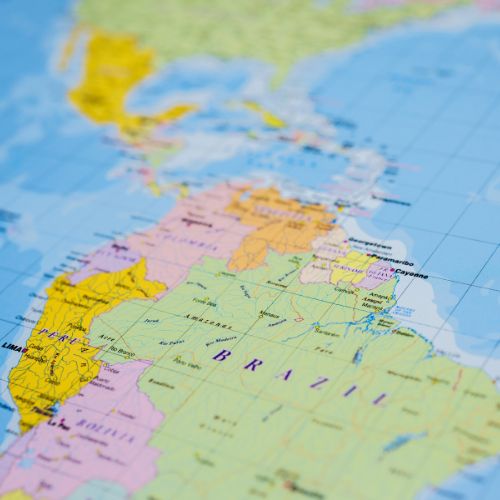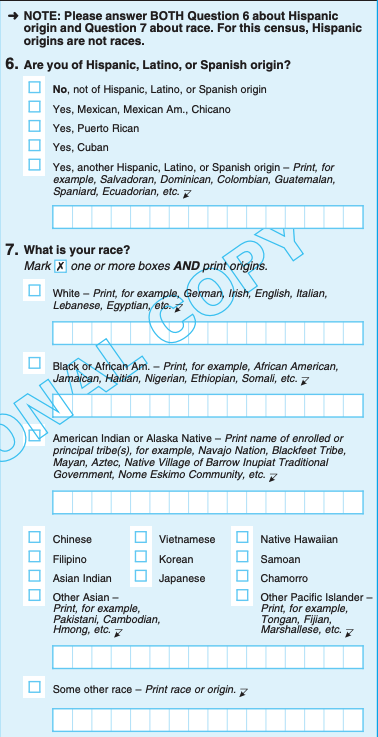Last Updated on March 3, 2025 by Eric Livingston
64 Million Hispanics and Latinos in the United States
- 64 Million Hispanics and Latinos in the United States
- Hispanics and Latinos Don't Mean the Same Thing
- Educate Americans on the Words Hispanic and Latino
- European Italians, Portuguese and Spaniards Aren’t Latinos | Brazilians, Guyanese and Haitians Aren’t Hispanic
- The U.S. Census Stopped Using Hispanic/Latino as a "Race"
- Why Use Latinos Instead of Hispanics?
- Why Latino is Better than Hispanic
- Brazilians Don’t Speak Spanish and Aren't Hispanic
- Bridge the Gap Between Hispanics and Latinos and All Other Americans
- Why Most Non-Latino Americans Don’t Speak Spanish
- The United States is No Doubt a Modern Day Success
- The United States is Highly Educated in Many Areas and Flat Out "Dumb" in Others, usually "Global Things"
- Teachers in the United States Must Be Paid More
- All Americans Should Visit "Real Mexico"
- Stop Constantly Comparing Mexico and the United States
- These Arguments Are Pointless
- Expats in Mexico aka Immigrants Feel the Need to Hate the United States
- Expats Are Delusional in Repeating How Nice Mexicans Are
- The United States is the Most Philanthropic Nation in the World
- If Keyboard Warriors Want to Argue at Least Provide Accurate Information
- Mexicans and Americans Have a Lot More in Common Than Most Realize
- Mexicans vs. Mexican-Americans
- No soy de aquí ni soy de allá
- Hispanics and Latinos Not Represented by Political Parties
- Look at The Data for Hispanics and Latinos in the United States
- Despite Hispanics and Latinos Representing Over Half of All Foreign-Born Residents the Latin American Region is Generally Ignored
- Presidential Visits to Other Nations Surpass that of Countries with Hispanics and Latinos
- Get Rid of Latinx Wokeness
- The Royal Spanish Academy Style Guide Doesn’t Acknowledge the Suffix -x
Hispanics and Latinos Don’t Mean the Same Thing
The Words “Hispanic” and “Latino” are NOT Interchangeable
Educate Americans on the Words Hispanic and Latino
The word Hispanic has “span” in it. Anyone can probably figure out it has to do with speaking Spanish or something “Spanish”. Latino, on the other hand, is based on geography as in “Latin America”. Latino includes people in this geographical region that speak a romance language such as French, Portuguese, and Spanish but doesn’t include non-romance languages. For example, people from the Bahamas, Belize, Cayman Islands, Guyana, Jamaica, and Trinidad and Tobago are not Latino even though they’re located in the Latin American region since their official language is English. Similarly, inhabitants of Suriname, which neighbors Guyana in South America, and the “ABC” islands of Aruba, Bonaire, and Curaçao are Dutch Caribbean territories. They are owned by the Netherlands in Europe, where Dutch is the official language, and are therefore not Latino. It’s worth noting that many people in Belize speak Spanish even though English is the official language.

European Italians, Portuguese and Spaniards Aren’t Latinos | Brazilians, Guyanese and Haitians Aren’t Hispanic
Just to be clear, Spain and Equatorial Guinea are the only 2 official Spanish speaking countries outside of Latin America. For whatever reason, the 1980 U.S. Census was fixated on the word “Hispanic”. In any event, the U.S. Census Bureau has updated form D-61 to a much better, more inclusive version that has removed “Hispanic and Latino” as a race on question 6 and changed it to mean “origin” while still asking for race on question 7.
| 7. Is this person of Spanish/Hispanic? origin or descent? Fill one circle. | o No (not Spanish/Hispanic) o Yes, Mexican, Mexican-Amer., Chicano o Yes, Puerto Rican o Yes, Cuban o Yes, other Spanish/Hispanic |
The U.S. Census Stopped Using Hispanic/Latino as a “Race”
The U.S. Census Bureau form D-61 has improved a lot over the years. However, I still don’t think it’s quite right. That’s just how diverse the United States population is. To the right you’ll see questions 6 and 7 in a 2020 version of the form. Question 6 is fine (although Equatorial Guinean) won’t fit in the box as it only allows for 16 characters. Equitorial Guinean has 18 characters including the space between the two words. I guess, they’d just abbreviate or something. Equatorial Guinea is a very small country of just under 1.5 million people that gained independence from Spain in 1968. Spanish is the official language of the country and I’m guessing some might identify themselves as Hispanic.
What About “Morenas y Morenos”?
Question 7 should be improved. It’s fine if they don’t include Hispanic or Latino as a race in question 6, however, what would a dark skinned Brazilian, Cuban or Dominican enter? They’re not necessarily mulatto (pure black and white mix). Many are mixed with Amerindian, Asian and Blacks. For example, Brazil is home to the largest Japanese population outside of Japan. Peru is home to a large number of Chinese immigrants that spawned the creation of Chifa Chinese/Peruvian cuisine. If we want to truly quantify race, then “morena/o” should be included on the form. I mean, do the following people look absolutely “white” or “black” or “Indian”? I’d say no, they don’t. The 3 images below showcase people that wouldn’t accurately be represented on the census. I realize there’s a spot at the bottom to manually enter “Some other race” but I don’t see why it isn’t included with a check box. Some people might even feel offended that they have to manually enter “Some other race” as if it’s not important enough to have a check box. Maybe I’m nitpicking. At least the form is a vast improvement over the 1980 version. I suggest the Census Bureau literally add the words “morena o moreno” as an option without botching it by trying to translate. Just add the feminine and masculine variations of the Spanish word as an option. Even English-speaking Latinos know what moreno and morena mean. Mulatto should also be added for children of black and white parents.




Why Use Latinos Instead of Hispanics?
Personally, I use the term Latinos because there are far more Latinos living in the United States than Hispanics. I think I’ve only met 1 person from Spain living in the United States while I was in college, yet I’ve met hundreds of Latinos. The largest immigration of Spaniards took place between 1911 and 1920 at 68,611. That was over 100 years ago. Today, most Spaniards live a quality, culture-filled life in a developed nation and have little reason to want to emigrate to the United States. The only other non-Latino country where the official language is Spanish is the teeny tiny nation of Equatorial Guinea in west Africa, although I’m guessing they’d likely be referred to as African over Hispanic, although cultural identity is a nuanced subject decided by individuals. I think they’re free to identify themselves either way.
Que es de piel oscura o de un color semejante al café: una mujer morena, un hombre moreno
Who has dark skin or a color similar to coffee: a dark-skinned woman, a dark-skinned man
Why Latino is Better than Hispanic
Spain itself experiences massive immigration from Latin America and Africa, both documented and undocumented. Latino is far more inclusive when referring to Spanish, Portuguese (Brazil), French (French Guiana, Haiti), speaking residents of the United States that come from Latin America. I’m not sure why Hispanic became the de-facto term years ago. I just know that there are large communities of Brazilians in places like Framingham, Massachusetts (mainly from Minas Gerais, Brazil) and Deerfield Beach, Pompano Beach and Miami, Florida that aren’t Hispanic, and their existence should be acknowledged correctly.
Brazilians Don’t Speak Spanish and Aren’t Hispanic
Brazilians are Latinos but aren’t Hispanic. If you ask Americans what language Brazilians speak, I bet most Americans would reply “Spanish” or “Brazilian” when indeed it’s Portuguese. Americans should be taught this in school. That doesn’t mean every person should strive to become a global scholar but some basic knowledge of the country and western hemisphere we live in would only improve relations. The Latino population in the United States is estimated at 64 million and keeps growing. Hispanics and Latinos represent one fifth of our population. Cultural awareness will only help current and future generations of non-Latinos learn something about their neighbors. To be clear, naturally there are some Brazilians that speak Spanish as a second language. Portuguese and Spanish share a lot of similar grammatical structure and vocabulary.
Bridge the Gap Between Hispanics and Latinos and All Other Americans
I think non-Latinos should show more interest in learning Spanish or even Portuguese. I’m not suggesting everyone should be fluent or anything of the sort. However, Americans should have a basic understanding of who is living in the United States. Our cities are named Los Angeles, Santa Fe, and San Francisco just to name a few. We have towns like Boca Raton in Florida and Ruidoso, New Mexico yet very few non-Latino Americans speak Spanish. We don’t live in a white, or black, English-speaking bubble nor should we. The United States has always been a diverse nation of immigrants. Why can’t we embrace that? On the other hand, all Hispanics and Latinos living in the United States should learn English. It goes both ways.
Why Most Non-Latino Americans Don’t Speak Spanish
Worldwide, people traditionally travel and vacation close to home as opposed to across the globe due to time and financial constraints. Therefore, many Europeans are bilingual or multilingual since their countries are so close to one another. They’re like “states” in the U.S. Portugal, for example, could fit in the United States 114.9 times. Italy could fit inside the United States 32.6 times. You get the idea. Unlike Europe, the United States is one large country sandwiched between English speaking Canada to the north and Spanish speaking Mexico to the south. Therefore, it’s not surprising that roughly 80% of Americans only speak English. The overwhelming majority of Americans that do speak Spanish are Latinos or Chicanos, whose parents or grandparents spoke Spanish as their first language.
The United States is No Doubt a Modern Day Success
The United States is without question the most influential country in the world. I know that so many people hate the United States. The truth is many are just jelly because of how successful and innovative the country is. People all over the world listen to U.S. music, drink Coca-Cola, eat at American franchises, watch American movies and Netflix series, watch YouTube, use Facebook, WhatsApp, Instagram and the list goes on… Haters will hate, and many will use “American” media like Twitter aka “X” or YouTube to post their hate toward America. How ironic. Any person or place that reaches a pinnacle of success will have its detractors. It’s happened throughout history. Regardless of what “empire” you’re referring to there’s people that will hate it and try to bring it down. The United States has numerous problems but it’s success overall as a nation can’t be denied.
The United States is Highly Educated in Many Areas and Flat Out “Dumb” in Others, usually “Global Things”
We should be teaching everyday Americans about other countries, cultures, and languages with accurate information. There is life beyond “tech” and “AI”. For example, many Americans believe Cinco de Mayo is Independence Day for Mexico, when in fact it’s on September 16th. Cinco de Mayo simply refers to a small battle the Mexican army won against France in the city of Puebla in on May 5th, 1862. Its celebration was short lived as the Mexicans were defeated by the French one year later in the Batalla de San Lorenzo (Spanish). The battle occurred on May 8th, 1863, in San Lorenzo Almecatla, Puebla (Spanish), just 13.1 kilometers away from Mexico’s victory one year prior. So yeah, it’s not a big deal in Mexico. It’s not even celebrated with the exception perhaps of a small acknowledgment in Puebla itself. It’s not a national holiday in Mexico. Cinco de Mayo is just another excuse for clueless Americans to get drunk without knowing or caring what it means. All Americans should be briefed on the history of Mexico.
Teachers in the United States Must Be Paid More
If you want good education, then pay teachers. I’m thinking of our future generations. The salary teachers receive for the important work they do and service they provide is pathetic. I don’t know what they’re teaching kids in school nowadays, but I hope it’s not just about Christopher Columbus in history class. I can’t believe Columbus Day is a holiday, yet he never set foot in the continental United States. Do students know this? There is much controversy as to whether Columbus was good or evil. I’ve seen both sides of the story written. Are explorers Leif Erikson, John Cabot, Amerigo Vespucci, and Juan Ponce de León, left out of the classroom? Teach Spanish to all students! Spanish is by far the second most spoken language in the United States. Additionally, the Metric System and Celsius Scale must be taught! That’s what the world uses!
All Americans Should Visit “Real Mexico”
When most Americans visit Mexico it’s usually for a few days to get away, usually to a party “English” destination like Cancún. Americans typically don’t go to Mexico to experience the culture, language, and vibrant cities throughout Mexico, including Mexico City (CDMX), which in my opinion is one of the greatest cities in the world. Mexico has 35 UNESCO World Heritage Inscriptions, more than any country in the western hemisphere. It has 10 more than the United States and is seventh worldwide just behind India, yet the average American doesn’t even know what that means. We should educate on both sides of the border. Mexico itself should do a better job at promoting more authentic destinations within its great country. We should be unifying Mexico and the United States instead of tearing them apart with “fake news” and insults.






Stop Constantly Comparing Mexico and the United States
It goes something like this in any forum or post about either country. Remember, people get a dopamine hit with controversy apparently. Not me. I personally don’t like either side and get tired of seeing this.
Mexico is so dangerous, full of drugs and cartels and is poor. It’s a hellhole.
Seriously? The U.S. has mass shootings every day and is way more dangerous than Mexico.
These Arguments Are Pointless
These types of arguments are all over the place. It gets old. You constantly hear American expats in Mexico say “I feel way safer here than in the U.S.” as if they must justify their reasons for moving to Mexico. All I say is “Really”? Where the hell did you live in the United States that you felt so dangerous? The south side of Chicago, Baltimore? Detroit, St. Louis? I just don’t get it. I’m from New England and NEVER felt danger, and our houses don’t have broken glass on tops of walls with barbed wire and steel bars to prevent crime.
Expats in Mexico aka Immigrants Feel the Need to Hate the United States
Many, expats (aka immigrants) in Mexico and elsewhere develop a real hatred of the United States and in all seriousness it’s usually because they’ve “failed” in the U.S. or simply couldn’t afford to live there. That’s the red pill truth. Most financially successful people in the United States with a nice home and family, don’t uproot their entire lives and move to Mexico. They just don’t. They may go on vacation or have a second home in Mexico, but they don’t make a permanent move. There’s only an estimated 1.6 million Americans living in Mexico, while there are 64 million Hispanics and Latinos in the United States with 60% of them being Mexican according to Pew Research. To be clear Pew Research didn’t differentiate between “Latinos” and “Hispanics” but a good estimate is 6 out of 10 Hispanics are Mexican totaling 37.8 million Mexicans living in the United States. Their research also showed that Mexicans made up the largest Hispanic immigrant population in 2021 at 34%, despite many Mexicans claiming it’s all Hondurans and Venezuelans. That’s simply not true.
Expats Are Delusional in Repeating How Nice Mexicans Are
Mexicans are nice, don’t get me wrong, but the vast majority of expats stating this are referring to people that serve them. Labor is cheaper in Mexico. Many expats have Mexicans that cook and clean for them. They typically have additional money to allow them to eat out frequently and get massages and so forth. Anytime someone is “serving” you they’re going to be nice, even in the U.S. When you leave a 25% tip in Mexico and think you’re doing something great, you’re really just making Mexicans look bad. You could say how nice Brazilians, Colombians, Cubans, Ecuadorians, Filipinos, Guatemalans, Hondurans, Nicaraguans, Peruvians and Venezuelans are as well. I’ve been to all and can tell you that I don’t see a difference in “niceness”. You could insert almost any country, at least in Latin America, perhaps with the exception of Argentina and Chile, as they have a reputation of being more reserved. It doesn’t mean they’re not good people though. I’d like to see how these American expats would fare trying to make friends with the wealthy Whitexicans of Polanco in Mexico City (CDMX) and San Pedro Garza García in Monterrey and see how “nice” they are compared to “Maria” who cleans their home or Fernando, el albañil, whose re-doing their kitchen.
The United States is the Most Philanthropic Nation in the World
The United States is a global leader in philanthropy and charitable giving, both in terms of individual and corporate donations. American philanthropy extends beyond domestic causes to include substantial support for international development, disaster relief, health initiatives, education, and various other charitable endeavors. Major foundations, such as the Bill and Melinda Gates Foundation, the Ford Foundation, and others, contribute significantly to global philanthropy. Philanthropy can be measured in various ways, including the total amount of charitable donations, the percentage of GDP dedicated to giving, and the overall culture of generosity within a society. The U.S. consistently ranks the highest. So yeah, Americans are nice too.
If Keyboard Warriors Want to Argue at Least Provide Accurate Information
If people want to only focus on negativity, they should at least provide factual information. It’s true that the United States has more mass shootings than Mexico, however the homicide rate per 100,000 is much greater in Mexico at 28.2 versus the U.S. 6.8 and Mexico has an awful history of violence against women. El Paso, Texas is WAY safer than neighboring Juarez, Mexico which is just a short walk from the center of El Paso. 80% of El Paso’s residents are Hispanic or Latino. Do you think they’d rather live in Juarez? Hell no! On the other hand, I wholeheartedly agree that Mérida, Yucatán is much safer than a place like Memphis, Tennessee. Regardless, why is that the focus of arguments when humanity should focus on collaboration and solutions?
Mérida, Yucatán Isn’t as Safe as So Many Expats Portray, I Live Here
I originally wrote this post on Thanksgiving Day, November 23, 2023. My bicycle was stolen in Mérida, Yucatán on Thanksgiving Day 2023 or at least that’s the first time I noticed it was missing. I live in the northern part of Mérida, Yucatán which is considered the safest. While I agree that there’s not much threat of violence in Mérida, Yucatán, I’m upset that my bicycle was stolen in the gated community where I live. It’s also not the first time I’ve heard of apartments and houses being broken into and robbed. No wonder why homes in Mérida, Yucatán have walls with broken glass bottles and barbed wire on top of them. I like Mérida, Yucatán but it’s FAR from being a paradise; not even close.
Mexicans and Americans Have a Lot More in Common Than Most Realize
Mexicans and Americans have a lot more in common than differences. Mexicans like the many of the same things Americans do. Mexicans have Costco memberships, start DIY projects with supplies from Home Depot on a Saturday morning, eat at P.F. Chang’s, Texas Roadhouse, McDonalds, patiently wait for a latte as the line goes out the door at Starbucks, and root for NFL teams. Contrary to what Expats in Mexico want you to believe, not every Mexican wants or has the time for café de olla or only eat at Doña Maria’s taqueria on the street corner. These “evil” American businesses, as so many expats want to label them, wouldn’t exist in Mexico if Mexicans didn’t buy what they’re offering. It’s that simple. They also provide jobs for Mexicans. On the other hand, Americans in the U.S. absolutely love Mexican food and no, I’m not referring to Taco Bell. Are we really that different? Sure, there is more poverty in Mexico and Cartels exist. It’s also true that the U.S. suffers from mass shootings. However, I think the majority of people only focus on negativity about Mexico or the United States instead of highlighting both countries positives and embracing our commonalities. Just think about what each country has contributed to the world. Personally, I enjoy both countries while acknowledging that nowhere is perfect.
Mexicans vs. Mexican-Americans
There’s an ongoing battle between Mexicans and Mexican-Americans. Many people aren’t aware of this. It’s sad really. A Mexican-American that embraces U.S. culture is generally looked down upon by Mexicans. Some Mexicans go so far as to call them “Pochos” which is a derogatory term. From what I understand, some Mexicans believe that Mexican-Americans think or act “superior” to Mexicans since they live in the United States. Mexicans ridicule them for not speaking Spanish or not embracing Mexican culture. I’ve seen bilingual Mexican-American YouTube creators in Mexico get reprimanded in the comments section by Mexicans for recording their videos in English instead of Spanish. They should be free to do whatever they what, “¡lo que se les dan la gana!”
No soy de aquí ni soy de allá
“No soy de aquí ni soy de allá” is a great song written by late Argentine song writer Facundo Cabral. It means “I’m not from here nor from there”. Personally, I like the cover version by late fellow Argentine/Spaniard Alberto Cortez, as he changed the lyrics slightly. Mexican-Americans can relate to this. Mexican-Americans are viewed by many as “too Mexican” to be American and “too gringo” to be Mexican therefore being rejected by both cultures. They don’t fit 100% in either society. Their diversity isn’t embraced by either side. Although I have zero Latin roots, I understand this feeling. I’ll never feel 100% American nor Mexican. Although I’m a permanent resident in Mexico and speak Spanish, I see how people look at me and can only imagine what they say behind my back, “pinche gringo” etc. At least in the U.S. I can “fake it” and people will just assume I’m like every other white guy. I can just feel how people in the U.S. react when I tell them I’m living in Mexico. I know in their head they’re like “why the hell would you live in Mexico?”
Hispanics and Latinos Not Represented by Political Parties
Left, or right? It doesn’t have to be the only choice. Personally, I believe I’m close to dead center. I believe in justice and equal rights for all people regardless of age, immigration status, race, sexual orientation and so forth. However, I don’t believe every law ever written should be changed. I don’t believe in the need for pronouns or words like Latinx that some “woke” person invented, thinking that they’re being “kind” to the Latin community. The term first appeared online around 2004, although it’s not clear who first made up the word. I believe both Democrats and Republicans lack a great deal of knowledge surrounding the Hispanic and Latino demographic in the United States. I’m all for black rights, but I’m also for Hispanic and Latino rights. The rights of blacks and pretty much anything “black” overshadows anything “Latino” despite being 7 percent less of the total Latino population.
Look at The Data for Hispanics and Latinos in the United States
The following data for Hispanics and Latinos in the United States Comes Directly from the U.S. Census Bureau titled 2022: ACS 1-Year Estimates Selected Population Profiles.
| Label | Estimate | Margin of Error |
|---|---|---|
| Foreign born; naturalized U.S. citizen | 24,509,131 | ±97,706 |
| Male | 46.4% | ±0.1 |
| Female | 53.6% | ±0.1 |
| Foreign born; not a U.S. citizen | 21,673,046 | ±140,276 |
| Male | 51.5% | ±0.2 |
| Female | 48.5% | ±0.2 |
| Population born outside the United States | 46,182,177 | ±149,842 |
| Entered 2010 or later | 31.4% | ±0.2 |
| Entered 2000 to 2009 | 22.9% | ±0.1 |
| Entered before 2000 | 45.6% | ±0.2 |
| WORLD REGION OF BIRTH OF FOREIGN BORN | — | — |
| Foreign-born population excluding population born at sea | 46,182,089 | ±149,839 |
| Europe | 10.2% | ±0.1 |
| Asia | 31.1% | ±0.1 |
| Africa | 6.0% | ±0.1 |
| Oceania | 0.6% | ±0.1 |
| Latin America | 50.3% | ±0.2 |
| Northern America | 1.8% | ±0.1 |
| LANGUAGE SPOKEN AT HOME AND ABILITY TO SPEAK ENGLISH | — | — |
| Population 5 years and over | 45,898,485 | ±150,253 |
| English only | 16.9% | ±0.1 |
| Language other than English | 83.1% | ±0.1 |
| Speak English less than “very well” | 46.0% | ±0.2 |
Despite Hispanics and Latinos Representing Over Half of All Foreign-Born Residents the Latin American Region is Generally Ignored
Politicians in the United States tend to only speak about people from nations that have very little immigration to the United States except for China. In the media all you hear about is China, Europe, Middle East, and Russia. You almost never hear about anything happening in Latin America unless it’s something negative about Mexico concerning cartels or immigrants crossing the border. Both Ecuador and Argentina recently elected new Presidents, yet I didn’t see coverage of that anywhere on mainstream media. Both South American countries are struggling. Ecuador is dealing with unprecedented narco violence, while Argentina is combating Venezuelan like inflation. Do you think the average American knows about any of this? Of course not.
Presidential Visits to Other Nations Surpass that of Countries with Hispanics and Latinos
Presidents have visited the United Kingdom, Canada, France, and Germany more than neighboring Mexico, a nation with a much greater population, and geopolitical importance in United States society not only in terms of a trading partner but a shared Mexican population, including Mexican, Mexican-Americans and Chicanos.
Get Rid of Latinx Wokeness
A study by the Pew Research Center found that while 23 percent Latinos in the U.S. had heard of the word “Latinx,” only 3 percent use it to identify themselves. 3 percent? Get rid of the word at least in the mainstream. “Latinos” has long been the word used to describe people from Latin America despite the use of the masculine gender. Even Latinas (women) are used to it. It’s part of their language. They don’t complain. Besides, it’s up to Latinos to decide if they want to change their own language. It’s certainly not up to English speaking Americans. A simple question on the ballet at the polls to Hispanics and Latinos could be included during an election and the people can decide. Learn from the disastrous marketing campaigns of Bud Light, Target, Victoria Secret and more. “Go woke, go broke” was a hard lesson to learn for unsuccessful marketing teams of major U.S. companies.
The Royal Spanish Academy Style Guide Doesn’t Acknowledge the Suffix -x
Critics, me included, argue that the term deviates from conventional grammar, poses pronunciation challenges, and shows disregard for traditional Spanish norms. The Royal Spanish Academy style guide doesn’t acknowledge “-x.” Advocates and detractors alike have referenced linguistic imperialism as a rationale for either supporting or opposing the term’s usage. In response to concerns of cultural appropriation by those attempting to Americanize the language, Democratic members of the Black and Puerto Rican caucuses introduced legislation seeking to prohibit its inclusion in government documents.
Latam Living Page List
Latam Living Post List
Moving Abroad? Congratulations! 5 Essential Things to Consider!
Moving Abroad? Congratulations! 5 Essential Things to Consider! Moving Abroad? Have You Considered What’s Truly…
Crazy! Mérida Record Temperature of 43.7 ºC (110.66ºF) 🥵
Crazy! Mérida Record Temperature Reaches 43.7 ºC (110.66ºF) On March 26th, 2024, Mérida Record Temperature…
9 Pros of Living in Mérida, Yucatán
9 Pros of Living in Mérida, Yucatán Here are 9 Pros of Living in Mérida,…
Mérida is Overhyped?
64 Million Hispanics and Latinos in the United States
64 Million Hispanics and Latinos in the United States Hispanics and Latinos Don’t Mean the…






